China Arts & Entertainment
CCTV New Year’s Gala 2017 Live Blog
It’s time for the CCTV Gala 2017: the special annual evening variety show that captures millions of viewers on Chinese New Year’s Eve.
Published
7 years agoon
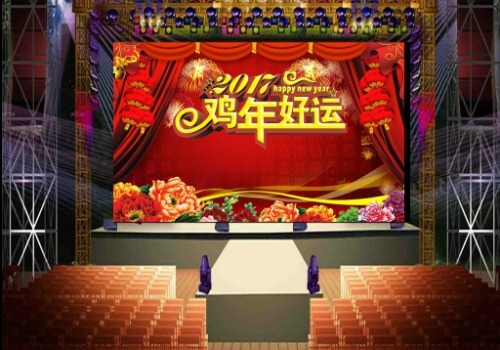
The biggest live television event in the world is about to start. Spring Festival is here and that means it is time for the CCTV New Year’s Gala 2017: the special annual evening variety show that captures millions of viewers on Chinese New Year’s Eve. What’s on Weibo provides you with the ins & outs of the 2017 Gala and its social media frenzy, with updates before, during and after the show. [Premium content]
Are you ready for the Year of the Rooster? Like every year, the start of Chinese New Year is celebrated with Chunwan, the CCTV Spring Festival Night Gala (中国中央电视台春节联欢晚会), better known as CCTV New Year’s Gala.
With an average viewership of 700/800 million, or 90% audience share, the event is the world’s most-watched TV show. The four-hour long spectacle, that starts at 8 pm Chinese time, is a both an entertainment show and propaganda platform – it features China’s biggest stars and best performers while also including the current Party propaganda outlines.
Stay with us to watch the gala and to get to know its ins & outs (also see our liveblog of 2016).
Live stream of the Gala on Youtube and on CCTV Gala official website.
Liveblog (now closed) :
27/01 18:34
Are you ready?
A little over three hours to go before the start of the CCTV Spring Festival Gala (央视春晚), the variety show that will entertain families all over China in the last hours of the Year of the Monkey with an evening full of music and performances. This year is the 35th edition of the Spring Festival Gala, which has been broadcasted since 1983. With a viewership of 700 to 800 million people, is the world’s most-watched TV show – bigger than the Oscars or the Super Bowl.
27/01 19:04
What to expect?
What can we expect at this year’s show? Like last year, the show will be broadcasted from various places besides its main venue in Beijing’s CCTV’s No.1 Studio. In 2016, the Gala was aired from Quanzhou, Xi’an, Guangzhou and Hulun Buir.
This year, it will be aired from Harbin, Guilin, Shanghai and Liangshan. Every city has its own hosts, who often welcome the audiences in their own local dialect or language, with performances that are related to the region. Last year the spectacular performance of singer Sun Nan (孙楠) who danced with 540 moving robots reinforced the image of Guangdong as the home of China’s tech startups.
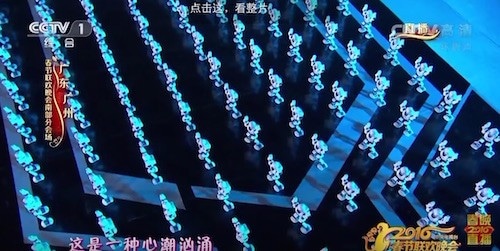
27/01 18:49
The show people love to hate
Just one hour to go! The CCTV Gala will feature a total of 34 different acts tonight, including singing, dancing, and comedy, in a time frame of around 4 hours.
It is a tradition for families to gather around the TV to watch the Gala before the New Year comes at midnight. The Gala usually is as much about entertainment as it is about political propaganda, and it is somewhat of a tradition to comment on the show and complain about it; criticism on the Gala is actually so commonplace that the sentence “there’ll never be a ‘worst’, just ‘worse than last year'” (“央视春晚,没有最烂,只有更烂”) has become a popular saying over the years.
Unsurprisingly, the show also drew much criticism in 2016 when some called the show a “propaganda disaster.” According to many viewers, the spectacle was “way too political” with its display of communist nostalgia, including the performance of different revolutionary songs such as ‘Without the Communist Party, There is No New China’ (没有共产党就没有新中国)… we can probably expect the same complaints on Chinese social media tonight.
27/01 12:31
Tonight’s hosts
This year, the main show of the CCTV Spring Festival Gala will be hosted by familiar faces: the presenters Zhu Jun (朱军), Dong Qing (董卿), Zhu Xun (朱迅) , Kang Hui (康辉) and Nëghmet Raxman.
The 52-year-old Chinese host and actor Zhu Jun is one of the most well-known CCTV faces. He has presented the CCTV New Year Gala since 1997. Dong Qing (43 years old) is also an annual host: she has hosted the Gala since 2005. Zhou Xun is a Chinese actress and singer, who will be on the show for the fifth time. Kang Hui is an influential CCTV news anchor and Nëghmet is a Chinese television host of Uyghur heritage.

Tonight there will be many stars appearing on the show, from kungfu star Jackie Chen to skit actor Pan Changjiang, Olympic star Fu Yuanhui, actress Yan Xuejing, comedian Jiang Kun, and many, many others.
27/01 12:44
The Mascot
It’s almost time to start! In the meantime, a little update on the CCTV mascot. In 2015, the CCTV Gala introduced an annual new mascot for its New Year’s Show. Last year’s mascot Kang Kang drew so much controversy with its unconventional appearance, that CCTV decided to play it safe this year with a traditional Rooster. The rooster will reappear throughout the show in the Gala’s logo. Besides this rooster there is also a more humorous one that appeared in the promotion video of the Gala.
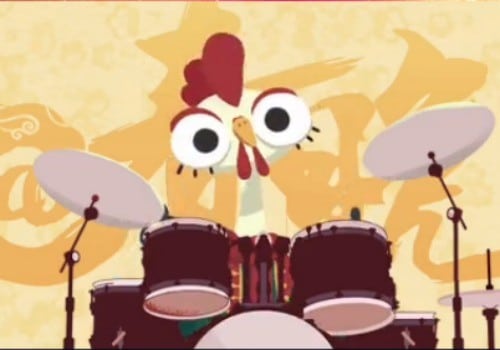
27/01 19:09
Here We Go!
Here we go! This year’s CCTV New Year’s Gala first starts with intertextual references to all the past “hits” of the gala, which has been aired since 1983. This opening act is a much-anticipated one, as the very popular boy group the TFBoys are performing together with beautiful Chinese actresses Liu Tao, Jiang Xin, Wang Ziwen, Yang Zi and Qiao Xin.
They are performing the song “Beautiful China Year” (美丽中国年).
The TFBoys have been very successful in China over the past years. They also appeared at last year’s Gala, and recently won the Weibo Awards for being the most popular on Chinese social media, for which they received nearly 63 million votes. Their performance here tonight might make it more appealing for younger audiences to watch the New Year’s Gala, which generally has a somewhat stuffy image.
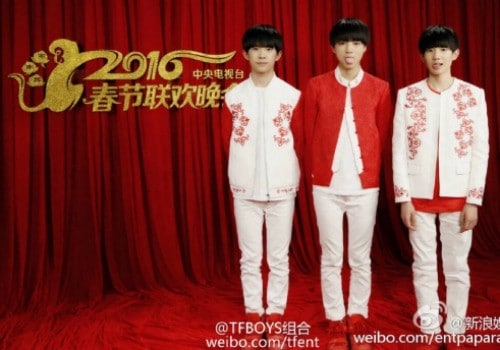
27/01 13:28
Theme: National Unity
Tonight’s hosts have welcomed us to this year’s Spring Gala and are introducing us to the other sub-venues from Harbin to Guilin, from Shanghai to Hong Kong. All the while the various ethnicities of China are emphasized. An important theme of this year (and previous years) is national unity, traditional culture and family affection. Previous year there was a special emphasis on the “Chinese Dream.”
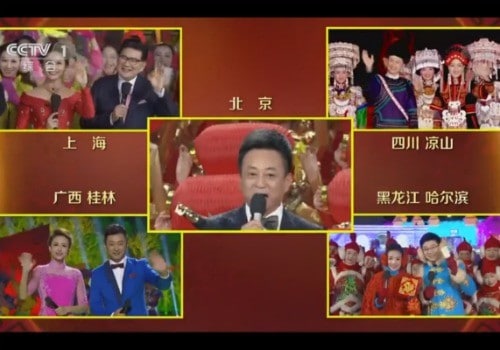
27/01 13:32
First Sketch
During tonight’s show there will be various performances, of which nine will be comical sketches. After we have just witnessed dozens of chickens dancing in a somewhat hysterical performance by the “Air Force BLue Sky Children’s Art Troupe”, it is now time for a comical sketch. These sketches often contain some political messages; previous year there was a special emphasis on corrupt officials.

This sketch called “Big City, Little Love” is performed by Liu Liang, Bai Ge and Guo Jinjie. It is about a young man, a migrant worker, who lied to his wife saying he has gone to work in the city where he had a “high position.” In fact, he is a window cleaner for high buildings.
27/01 13:40
“In This Moment”
This is the older song “In this moment” (在此刻) performed by singers Hu Ge and Wang Kai (胡歌, 王凯). (Watch the show live here https://youtu.be/8Tnna8odMvA).
27/01 13:52
“Older Couple”
This second sketch of tonight has some big stars. Cai Ming (蔡明) is a singer, actress, and sketch performer notable for performing sketch comedy in CCTV New Year’s Gala since 1991 – she is known for her sharp language. Pan Changjiang also is a Chinese skit actor and sitcom actor. In his early years, he appeared regularly in the CCTV New Year’s Gala.
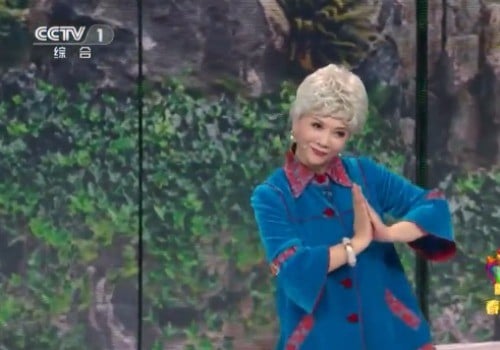
This sketch is called “Older Couple” and is about a man who forgot what his wife looked like until Cai comes along and pretends to be his wife. In the end it turns out that it is not him, but her who lost her memory. When she remembers – in a The Notebook kind of scene – the couple falls into each other’s arms.
27/01 13:59
Over to Liangshan
We are now moving over from Beijing’s studio to the venue in Liangshan (凉山), Sichuan province. We first see the dance ‘fire of celebration’, followed by a song titled “Deep Feelings, Long Friendship” (情深谊长). The Chinese singer performing here is named Jike Junyi or simply ‘Summer’. She is a 28-year-old singer who was born and raised in Liangshan. She is wearing traditional Yizu (彝族) minority clothing and sings about the Long March.
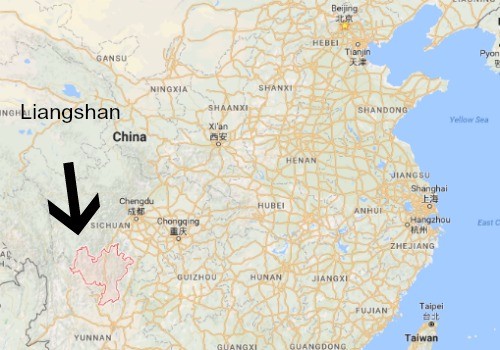
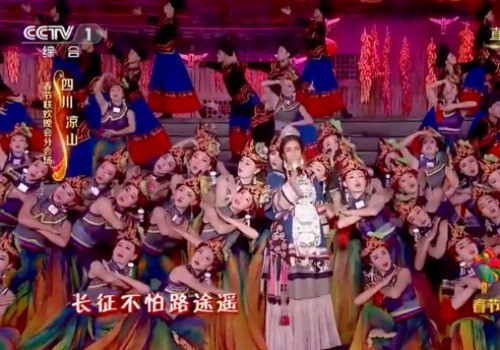
Summer’s performance is followed by a catchy tune by singers Li Keqin and Cai Zuoyan, who sing with some Sichuanese touch to it. The fire torches in the background are also an Yi minority tradition.
27/01 14:11
Crosstalk
We’re back in Beijing for this crosstalk (相声) scene by Gao Xiaopan and You Xiancha (高晓攀、尤宪超). Different from the other sketches (小品), crosstalk usually involves two actors with one being the “joker” and the other being the “teaser”.
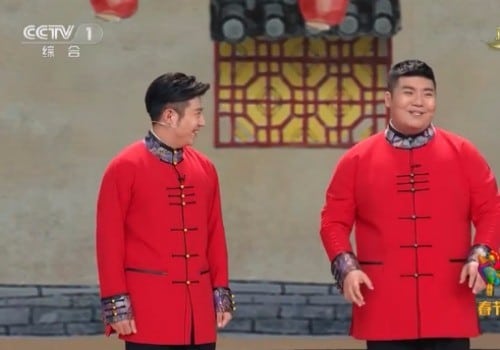
Other than the other sketches, crosstalk is about word jokes and playing with rhythm and language. This particular scene is about two men looking back on their childhood, and the nostalgic things about being brought up by their grandmother. This scene, that represents some sort of collective memory, will be especially appealing to China’s post-1980s generations who were often raised by their grandparents. Apart from national unity and traditional culture, family affection is one of this year’s themes for the Spring Festival Gala. It touches a sensitive nerve for many, as it makes them think back of their own grandmother.
27/01 14:17
Wow, Li Yanchao
The next performance is a pretty stunning underwater-kind-of-scene with Chinese dancer Li Yanchao (李艳超) stealing the show. The female host says: “Let’s express the hope that in the new year, there will be more patches of grass under our feet, and more blue sky above our head.”
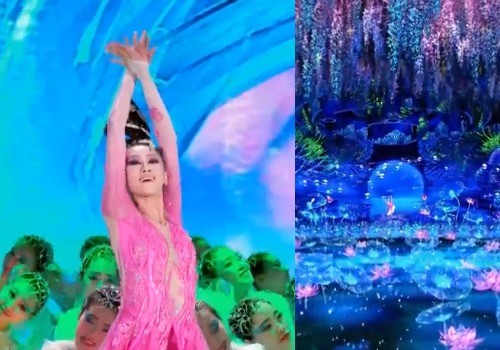
27/01 14:32
The Match-Making Show
This funny sketch imitates one of China’s most popular dating shows If You Are The One 非诚勿扰. They get succesfully matched, but then it turns out that they are actually a divorced couple. This is the 3rd of a total of 6 comical sketches that will be performed tonight.
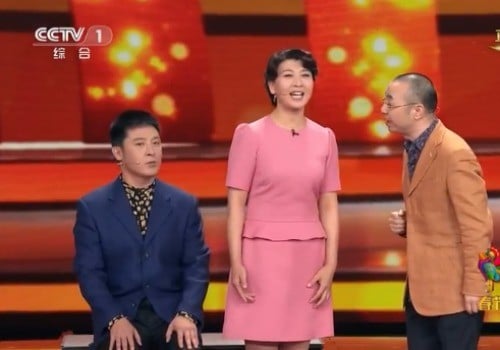
The main conflict of this sketch is that the woman wants her husband’s attention, while he thinks making money is more important than being his wife’s side – a common conflict in middle-aged families in China today. Since tonight’s theme is family affection, the sketch ofcourse has a happy end with both husband and wife expressing their love for each other.
27/01 14:31
Is this show really live?
Is this really live? Yes it is. But although the Gala is a live broadcast from CCTV’s No.1 Studio, and its other venues across China, every year’s show has a taped version of the full dress rehearsal. The tape of the official rehearsal runs together with the live broadcast, so that in the event of a problem or disruption, the producers can seamlessly switch to the taped version without TV audiences noticing anything.
27/01 19:53
Two stars, different generations
Here are are teen idol Jason Zhang (张杰) and Mao Amin, one of China’s most famous and female pop stars of the mid-1990s. You might notice that Mao Amin’s voice is much firmer and fuller than Zhang Jie’s. In Mao Amin’s generation, most singer got popular because of their skills, not for their looks..

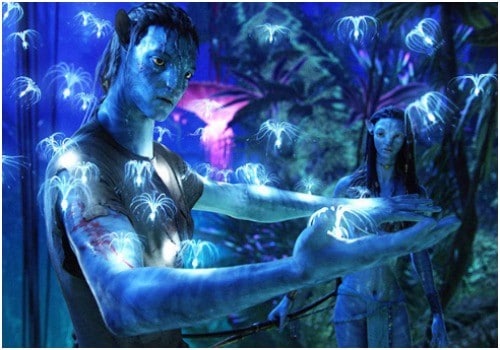
The set of this song is so extravagant and spectacular, that some netizens think that this year’s CCTV gala director, Yang Dongsheng, must be a big fan of Avatar the Movie.
27/01 14:48
Here’s Guilin!
We’re now moving from Beijing to Guilin in Guangxi. The event is performed near Guilin’s famous Elephant Trunk Hill, where various Taiwan and Hongkong singers are invited to sing folk songs. The first song is a well-known traditional Chinese song: the Mountain Song from the famous Chinese movie Third Sister Liu 刘三姐. The scene here seems to include fragments of Zhang Yimou’s Impressions Liu San Jie show.
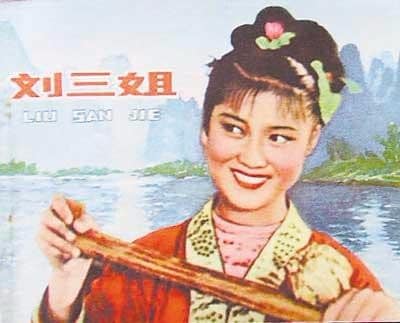
27/01 14:58
Nostalgia
This year’s CCTV Gala is looking back on previous years. This is the 35th year the Gala is broadcasted, and this edition started with a look back on top hits over the past three decades. This sketch also reflects on the past of the Gala, as the actors have previously performed a sketch here in 1987. Its message is that the society today is not the same as the society of 30 years ago. It reflects on how many people are bystanders, and that few people are helping each other out.
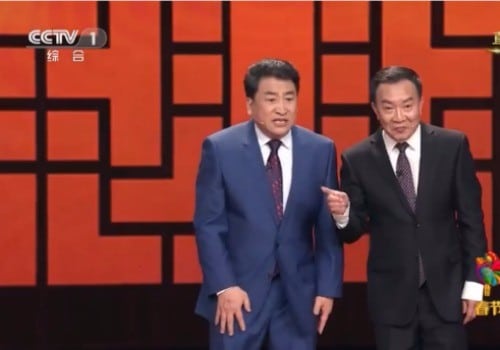
27/01 15:04
Heroes of the Red Army
Time to honour some communist heroes – a recurring part of the CCTV New Year Gala. One of the elderlies honored here is aged 104 was around 22 years old during the Long March.
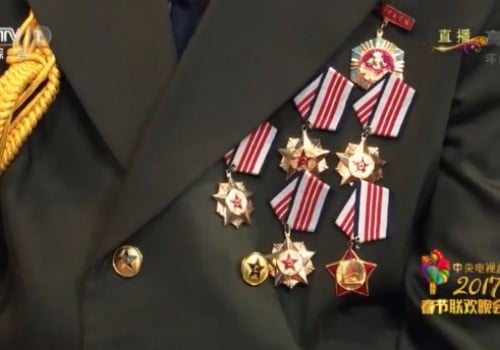
27/01 15:11
Propaganda Platform?
The Communist and military songs of last year’s Gala annoyed many netizens, who thought the Gala was merely a propaganda platform rather than a variety show. But it is a recurring part in virtually every show.
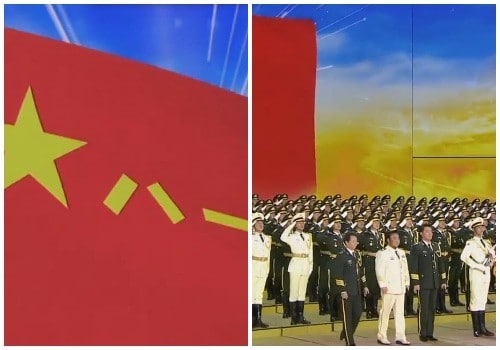
27/01 15:16
Hashtag #CCTVGALA
On Weibo, the views and comments on the hashtag #CCTVGala (#春晚#) have by now exploded, with over 13 billion views and 52 million comments.
One popular post is that from a netizen who tells she was watching the Gala and the TFBoys with her grandma on an old TV set when her grandmother asked: “Is that boy on the left not feeling well?”
27/01 15:22
Family First
It is clear that family affection is one of this year’s main topics, as all sketches revolve around family relations. This sketch deals with the relationship between children and parents in law. Instead of talking about the well-known daughter and mother in law conflicts, it talks about the relations between son and father in law. Although the father does not like his son in law, the young man is really trying to help him either way.
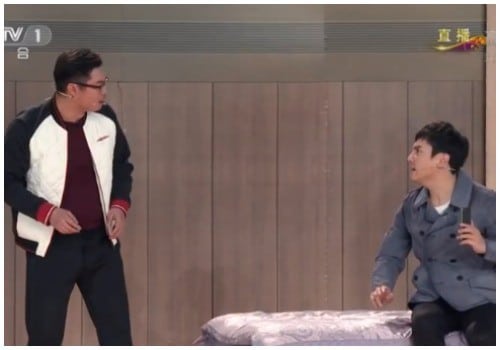
27/01 15:28
90 Minutes to go!
There’s still 90 minutes to go before the New Year! Main themes of the night up to now: national unity (dancing minorities!) and family affection (marriage and family harmony!).
We have already seen Liangshan and Guilin subvenues, and will still see performances from the venues in Shanghai and Harbin in the coming 1,5 hours.
Meanwhile, Weibo netizens are wondering why the actress from a sketch earlier tonight, the renowned Cai Ming, was copying Elsa from Frozen.
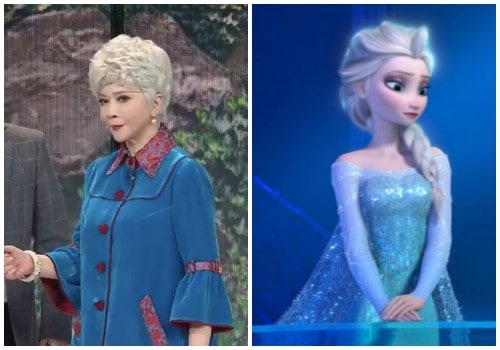
27/01 15:35
Chinese Opera
This is a compilation of songs, such as “One Generation to Another” (薪火相传), by various Chinese Opera performers and troupes.
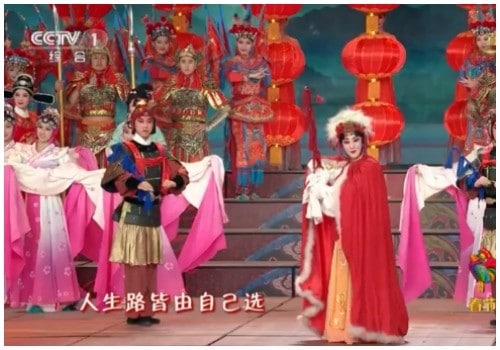
27/01 19:19
Look at China
This song titled “Look at the mountains, look at the water, look at China” (看山看水看中国) by Lu Jihong and Zhang Ye (吕继宏, 张也) is an ode to China’s different landscapes. It is accompanied by a clip that shows different places in China, from the nature in the south to the big cities in the north.
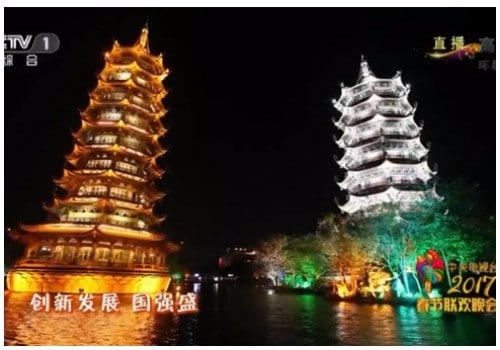
27/01 16:31
Minority Sketch
This sketch called “A Tianshan Situation” (天山情) focuses on the people of the mountainous area on the border between Xinjiang and Mongolia. The act is mostly spoken in north-eastern dialect, with a slight Shanghai dialect. The sketch is about a train track project in their region that has shocked the cows due the noise, affecting their milk production. When all goes well in the narrative, the Uyghur people finally thank the Chinese Han people for saving their life and everything they have done and for saving their lives – perhaps a somewhat controversial angle…
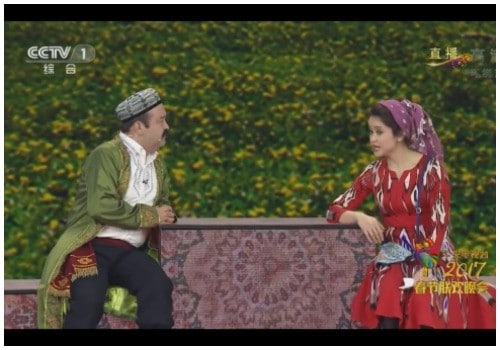
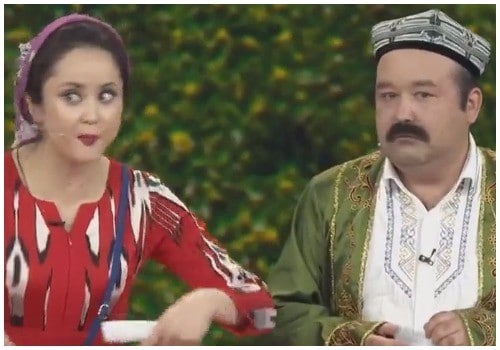
27/01 16:05
Switching to Harbin
One of today’s subvenues is Harbin, in northern province of Heilongjiang, home to the famous Harbin Ice World. The park has dozens of enormous buildings and sculptures completely made from ice. The city is currently about -20 celcius; perfect weather for acrobatics on ice!
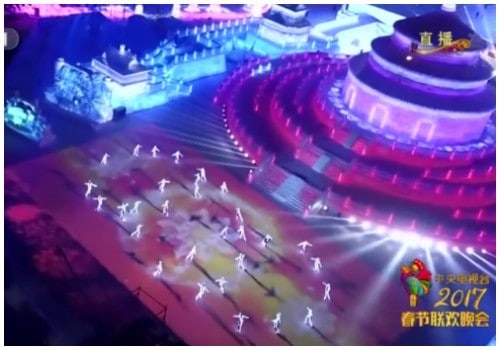
27/01 16:09
These are the Champions
The National Martial Arts team has arrived to the stage. These are all China’s top martial art champions. More than 60 of them, both men and women, are performing together here tonight.
27/01 16:11
Public Announcement
Every year’s CCTV Gala has a “public advertisement” (公益广告) , a movie that is often emblematic of the morals or the guidelines the Party leadership wants to emphasize for the Chinese New Year. With an audience of 700 to 800 people, the show is the perfect propaganda platform.
27/01 19:35
Dancing Pineapples
Yes. We are now watching dancing pineapples and watermelons. Always when you think it cannot get worse, it always does – as many netizens say. This is a song that encourages people to do sports and eat healthy; one of this year’s themes is also to promote good (mental and physical) health.
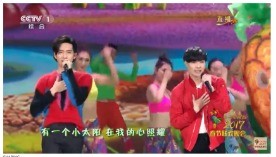
27/01 19:17
Trusting people
In one the night’s last comical sketches called ‘Trust’ (信任), we see famous comedian Lin Yongjian in a narrative about trusting people. On New Year’s Eve, a taxi customer wants to go upstairs to pick something up – but the taxi driver is afraid they will walk off. The customer is also afraid the driver will drive off. It is during this sketch that Olympic swimmer Fu Yuanhui, one of the most popular social media figures of 2016, pops up for a short role. She performs some tongue twisting sentences in Anhui dialect.
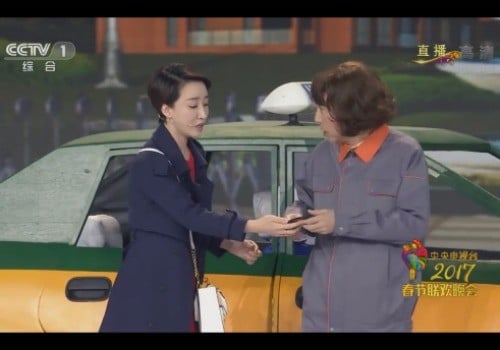
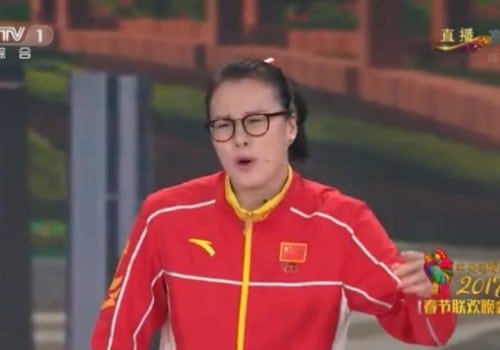
27/01 16:39
Honouring the Astronauts
Time to honour 11 Chinese astronauts.
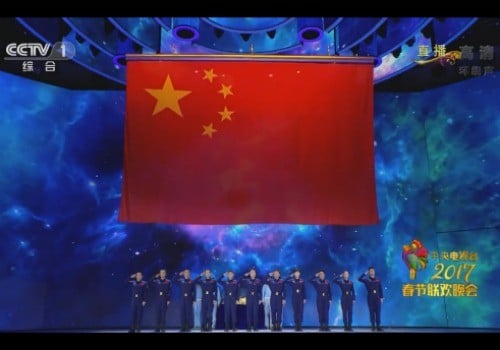
27/01 19:14
Here’s Jackie Chan! But what on earth is he doing?
In this song that is simply titled “Country” (国家), Jackie Chan steps out with students from Peking University to sing about his love for China (“I love my home”) while doing a dance that entails what looks like sign language. Perhaps not really what you would expect the “kungfu master” to do.
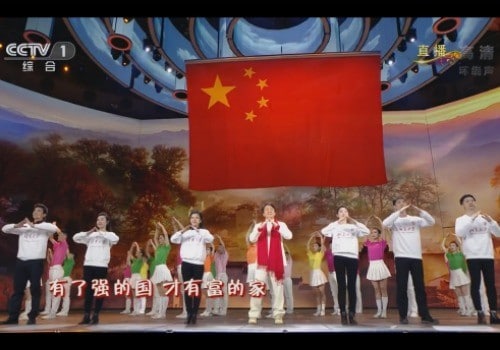
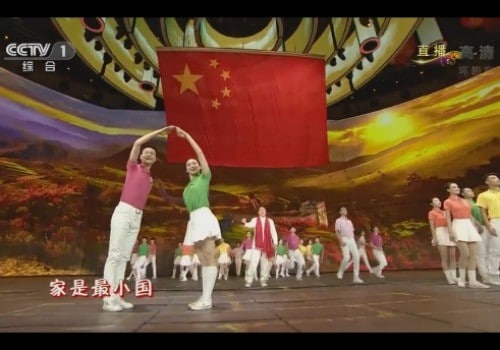
28/01 09:23
Shanghai Dream City
Now over to Shanghai for a song by Chinese singers Coco Lee and JJ Lin about “Dream City” Shanghai. We see a futuristic scene with motors going round in a big metal round set-up in front of the iconic Pearl Tower. It is one of the most spectacular scenes of the night, comparable to that of the dancing robots in 2016.
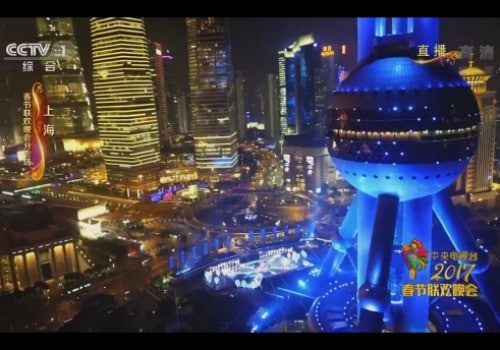
27/01 16:56
Almost time!
It is almost time for the 12 o’clock moment! Just before we will hear a song by singers Han Lei and Tan Weiwei with what looks like a somewhat cringeworthy company of farmers, migrant workers, hospital staff and soldiers to represent “all the Chinese people.”
27/01 17:01
HAPPY NEW YEAR!
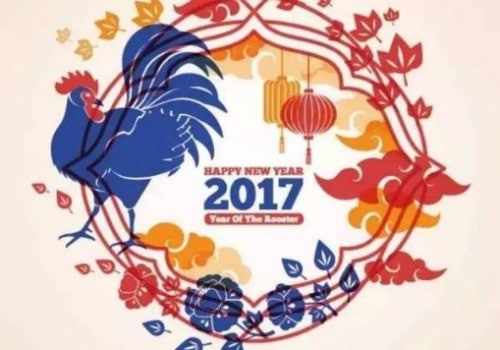
The hosts of tonight’s Gala are wishing everybody a happy Chinese New Year. And of course we at What’s on Weibo are also wishing you a happy Year of the Rooster.
27/01 19:11
“Mother China”
Just immediately after the New Year countdown, here comes a song called “Mother China” (母亲是中华).
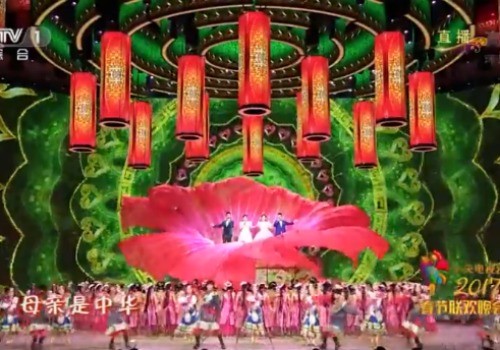
27/01 17:11
Interlude
A little interlude clip shows Chinese abroad singing about the “Chinese feeling” (中国心). The CCTV festival is watched by millions of Chinese within the PRC, but there is also a huge viewership outside of China.
27/01 17:19
The last sketch of the night stresses national unity
The last sketch of the night is a typically southern sketch, set during the peak of the G20 Summit in Hangzhou. The story takes place in a community park, where the four protagonists have a misunderstanding. The narrative focuses on people’s good morals, and is full of Jiangsu and Zhejiang dialect.

This sketch, like the one of the “Tianshan Mountains” and the story of the Uighur herdsmen, again shows the theme of national unity.
27/01 18:16
More Family Love
“Leave the Grasslands” (离别草原) is sung by famous singer Yun Fei and the female singer Yun Duo. It is followed by another short film that stresses family affinity.
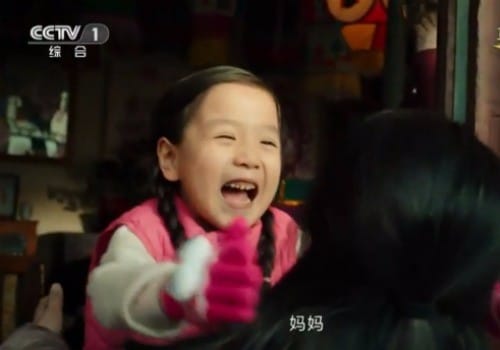
27/01 17:34
“Stop!”
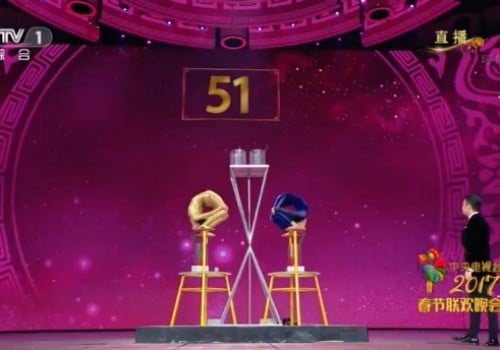
In one of the last acts of the night with a foreign acrobat, the hosts speak some very clearly pronounced English sentences: “Here are the flowers!” and “Stop!” In a game where a Chinese and a foreign acrobat compete to collect as many flowers within 60 seconds, the Chinese woman wins with 16 flowers versus 15 of the foreign acrobat.
27/01 19:13
Dancing Troupe
Chinese singer Wu Tong sings the song “Deep Feelings” (一片深情) accompanied by a group of male dancers.
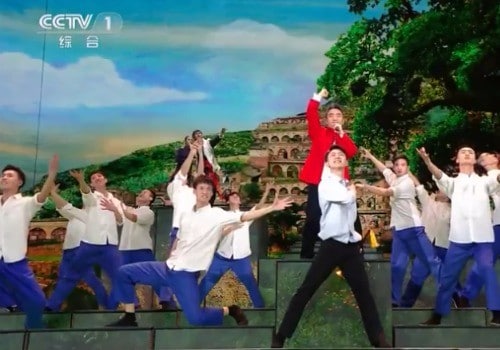
27/01 17:48
Unforgettable Night
The last songs of this night are “Magnificent Journey” (壮丽航程, by Yan Weiwen and Yin Xiumei) and “Unforgettable Night” (难忘今宵). The latter is sung by the 72-year-old singer and dancer Li Guyi and the 64-year-old mezzo-soprano singer Guan Mucun. Li Guyi sings the same song every year at the end of this show.
During these songs, the screen behind the dancers show images of the G20, new glass bridges, windmills, and all kinds of big projects that have been established or organized in China over the past year.
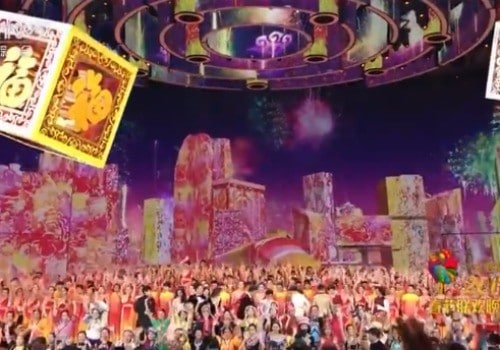
The last song ends with all performers of the Beijing venue on stage. The hosts wish everyone a happy newyear. “See you next year!”, they say.
27/01 19:10
Trending after the Gala: “Brother Smile”
Directly after the ending of the CCTV Gala, many Weibo netizens are talking about one person in the audience as observant viewers have spotted the very same man in the audience of the CCTV Gala every year since 1999. The man, who is now nicknamed ‘CCTV Gala Brother Smile’ (#春晚笑脸哥#), was again spotted in the audience tonight.
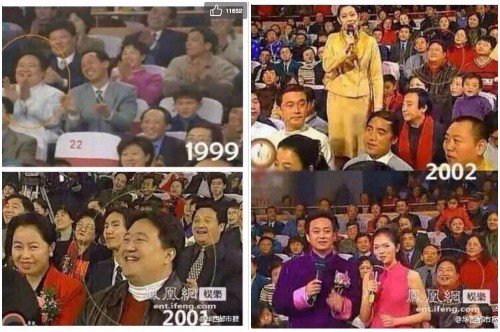
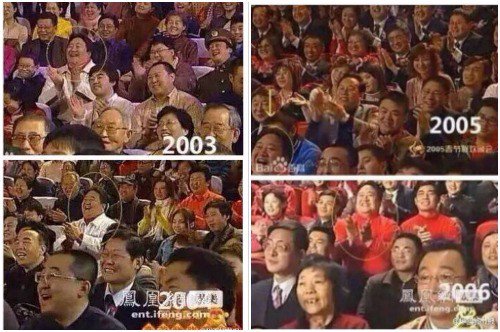
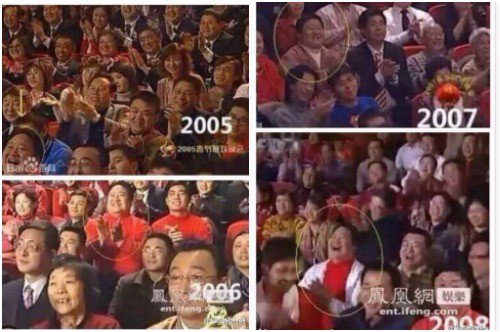
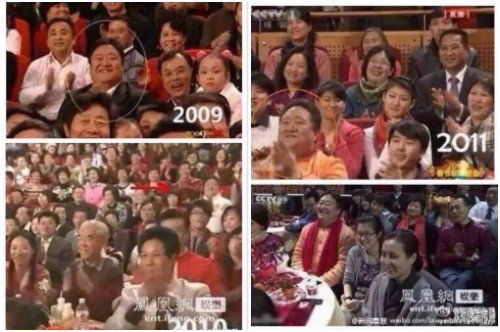
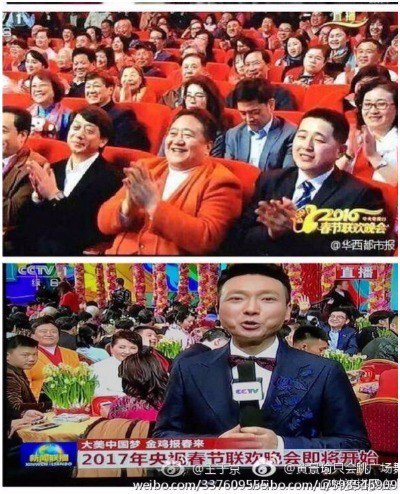
The man has gone viral over Chinese social media now. Many netizens are extremely curious about the man, wondering how he came to sit from the back of the audience to the front crowd throughout the years. Some also compliment him for not having changed much over the past 18 years.
27/01 18:13
That’s a Wrap!
This liveblog will be closing now. We hope you enjoyed the night!
– By Manya Koetse
Follow on Twitter or Like on Facebook
What’s on Weibo is an independent blog. Want to donate? You can do so here.
Sources on Chunwan
Kang, Liu. 2010. “Searching for a New Cultural Identity: China’s soft power and media culture today.” In Suijian Guo and Baogang Guo (eds), Thirty Years of China-U.S. Relations: Analytical Approaches and Contemporary Issues, 197-253. Lanham: Rowman & Littlefield Publishers.
Scocca, Tom. 2011. Beijing Welcomes You: Unveiling the Capital City of the Future. New York: Riverhead Books.
Wang Ge. 2015. “Popular Spring Festival Gala language: Sociocultural Observations.” In Linda Tsung and Wei Wang, Contemporary Chinese Discourse and Social Practice in China, 185-200. Amsterdam/Philadelpia: John Benjamins Publishing Company.
Ying Zhu. 2012. Two Billion Eyes: The Story of China Central Television. New York: The New Press.
©2016 Whatsonweibo. All rights reserved. Do not reproduce our content without permission – you can contact us at info@whatsonweibo.com.
Manya Koetse is the founder and editor-in-chief of whatsonweibo.com. She is a writer, public speaker, and researcher (Sinologist, MPhil) on social trends, digital developments, and new media in an ever-changing China, with a focus on Chinese society, pop culture, and gender issues. She shares her love for hotpot on hotpotambassador.com. Contact at manya@whatsonweibo.com, or follow on Twitter.

China Arts & Entertainment
“Old Bull Eating Young Grass”: 86-Year-Old Chinese Painter Fan Zeng Marries 36-Year-Old Xu Meng
Online reactions to the news of Fan’s marriage to Xu Meng, his fourth wife, reveal that the renowned artist is not particularly well-liked among Chinese netizens.
Published
2 days agoon
April 18, 2024
The recent marriage announcement of the renowned Chinese calligrapher/painter Fan Zeng and Xu Meng, a Beijing TV presenter 50 years his junior, has sparked online discussions about the life and work of the esteemed Chinese artist. Some netizens think Fan lacks the integrity expected of a Chinese scholar-artist.
Recently, the marriage of a 86-year-old Chinese painter to his bride, who is half a century younger, has stirred conversations on Chinese social media.
The story revolves around renowned Chinese artist, calligrapher, and scholar Fan Zeng (范曾, 1938) and his new spouse, Xu Meng (徐萌, 1988). On April 10, Fan announced their marriage through an online post accompanied by a picture.
In the picture, Fan is seen working on his announcement in calligraphic form.

Fan Zeng announces his marriage on Chinese social media.
In his writing, Zeng shares that the passing of his late wife, three years ago, left him heartbroken, and a minor stroke also hindered his work. He expresses gratitude for Xu Meng’s care, which he says led to his physical and mental recovery. Zeng concludes by expressing hope for “everlasting harmony” in their marriage.
Fan Zeng is a calligrapher and poet, but he is primarily recognized as a contemporary master of traditional Chinese painting. Growing up in a well-known literary family, his journey in art began at a young age. Fan studied under renowned mentors at the Academy of Fine Arts in Beijing, including Wu Zuoren, Li Keran, Jiang Zhaohe, and Li Kuchan.
Fan gained global acclaim for his simple yet vibrant painting style. He resided in France, showcased his work in numerous exhibitions worldwide, and his pieces were auctioned at Sotheby’s and Christie’s in the 1980s.[1] One of Fan’s works, depicting spirit guardian Zhong Kui (钟馗), was sold for over 6 million yuan (828,000 USD).

Zhong Kui in works by Fan Zeng.
In his later years, Fan Zeng transitioned to academia, serving as a lecturer at Nankai University in Tianjin. At the age of 63, he assumed the role of head of the Nankai University Museum of Antiquities, as well as holding various other positions from doctoral supervisor to honorary dean.
By now, Fan’s work has already become part of China’s twentieth-century art history. Renowned contemporary scholar Qian Zhongshu once remarked that Fan “excelled all in artistic quality, painting people beyond mere physicality.”
A questionable “role model”
Fan’s third wife passed away in 2021. Later, he got to know Xu Meng, a presenter at China Traffic Broadcasting. Allegedly, shortly after they met, he gifted her a Ferrari, sparking the beginning of their relationship.

A photo of Xu and her Hermes Birkin 25 bag has also been making the rounds on social media, fueling rumors that she is only in it for the money (the bag costs more than 180,000 yuan / nearly 25,000 USD).
On Weibo, reactions to the news of Fan’s marriage to Xu Meng, his fourth wife, reveal that the renowned artist is not particularly well-liked among netizens. Despite Fan’s reputation as a prominent philanthropist, many perceive his recent marriage as yet another instance of his lack of integrity and shamelessness.

Fan Zeng and Xu Meng. Image via Weibo.
One popular blogger (@好时代见证记录者) sarcastically wrote:
“Warm congratulations to the 86-year-old renowned contemporary erudite scholar and famous calligrapher Fan Zeng, born in 1938, on his marriage to Ms Xu Meng, a 50 years younger 175cm tall woman who is claimed to be China’s number one golden ratio beauty. Mr Fan Zeng really is a role model for us middle-aged greasy men, as it makes us feel much less uncomfortable when we’re pursuing post-90s youngsters as girlfriends and gives us an extra shield! Because if contemporary Confucian scholars [like yourself] are doing this, then we, as the inheritors of Confucian culture, can surely do the same!“
Various people criticize the fact that Xu Meng is essentially just an aide to Fan, as she can often be seen helping him during his work. One commenter wrote: “Couldn’t he have just hired an assistant? There’s no need to turn them into a bed partner.”
Others think it’s strange for a supposedly scholarly man to be so superficial: “He just wants her for her body. And she just wants him for his inheritance.”
“It’s so inappropriate,” others wrote, labeling Fan as “an old bull grazing on young grass” (lǎoniú chī nèncǎo 老牛吃嫩草).
Fan is not the only well-known Chinese scholar to ‘graze on young grass.’ The famous Chinese theoretical physicist Yang Zhenning (杨振宁, 1922), now 101 years old, also shares a 48-year age gap with his wife Weng Fen (翁帆). Fan, who is a friend of Yang’s, previously praised the love between Yang and Weng, suggesting that she kept him youthful.

Older photo posted on social media, showing Fan attending the wedding ceremony of Yang Zhenning and his 48-year-younger partner Weng Fen.
Some speculate that Fan took inspiration from Yang in marrying a significantly younger woman. Others view him as hypocritical, given his expressions of heartbreak over his previous wife’s passing, and how there’s only one true love in his lifetime, only to remarry a few years later.
Many commenters argue that Fan Zeng’s conduct doesn’t align with that of a “true Confucian scholar,” suggesting that he’s undeserving of the praise he receives.
“Mr. Wang from next door”
In online discussions surrounding Fan Zeng’s recent marriage, more reasons emerge as to why people dislike him.
Many netizens perceive him as more of a money-driven businessman rather than an idealistic artist. They label him as arrogant, critique his work, and question why his pieces sell for so much money. Some even allege that the only reason he created a calligraphy painting of his marriage announcement is to profit from it.
Others cast doubt on his status as a Chinese calligraphy ‘grandmaster,’ noting that his calligraphy style is not particularly impressive and may contain typos or errors. His wedding announcement calligraphy appears to blend traditional and simplified characters.

Netizens have pointed out what looks like errors or typos in Fan’s calligraphy.
Another source of dislike stems from his history of disloyalty and his feud with another prominent Chinese painter, Huang Yongyu (黄永玉). Huang, who passed away in 2023, targeted Fan Zeng in some of his satirical paintings, including one titled “When Others Curse Me, I Also Curse Others” (“人骂我,我亦骂人”). He also painted a parrot, meant to mock Fan Zeng’s unoriginality.

Huang Yongyu made various works targeting Fan Zeng.
In retaliation, Fan produced his own works mocking Huang, sparking an infamous rivalry in the Chinese art world. The two allegedly almost had a physical fight when they ran into each other at the Beijing Hotel.

Fan Zeng mocked Huang Yongyu in some of his works.
Fan and Huang were once on good terms though, with Fan studying under Huang at the Central Academy of Fine Arts in Beijing. Through Huang, Fan was introduced to the renowned Chinese novelist Shen Congwen (沈从文, 1902-1988), Huang’s first cousin and lifelong friend. As Shen guided Fan in his studies and connected him with influential figures in China’s cultural circles, their relationship flourished.
However, during the Cultural Revolution, when Shen was accused of being a ‘reactionary,’ Fan Zeng turned against him, even going as far as creating big-character posters to criticize his former mentor.[2] This betrayal not only severed the bond between Shen and Fan but also ended Fan’s friendship with Huang, and it is still remembered by people today.
Fan Zeng’s behavior towards another former mentor, the renowned painter Li Kuchan (李苦禪, 1899-1983), was also controversial. Once Fan gained fame, he made it clear that he no longer respected Li as his teacher. Li later referred to Fan as “a wolf in sheep’s clothes,” and apparently never forgave him. Although the exact details of their falling out remain unclear, some blame Fan for exploiting Li to further his own career.
There are also some online commenters who call Fan Zeng a “Mr Wang from next door” (隔壁老王), a term jokingly used to refer to the untrustworthy neighbor who sleeps with one’s wife. This is mostly because of the history of how Fan Zeng met his third wife.
Fan’s first wife was the Chinese female calligrapher Lin Xiu (林岫), who came from a wealthy family. During this marriage, Fan did not have to worry about money and focused on his artistic endeavours. The two had a son, but the marriage ended in divorce after a decade. Fan’s second wife was fellow painter Bian Biaohua (边宝华), with whom he had a daughter. It seems that Bian loved Fan much more than he loved her.
It is how he met his third wife that remains controversial to this day. Nan Li (楠莉), formerly named Zhang Guiyun (张桂云), was married to performer Xu Zunde (须遵德). Xu was a close friend of Fan, and helped him out when Fan was still poor and trying to get by while living in Beijing’s old city center.
Wanting to support Fan’s artistic talent, Xu let Fan Zeng stay over, supported him financially, and would invite him for meals. Little did he know that while Xu was away to work, Fan enjoyed much more than meals alone; Fan and Xu’s wife engaged in a secret decade-long affair.
When the affair was finally exposed, Xu Zunde divorced his wife. Still, they would use his house to meet and often locked him out. Three years later, Nan Li officially married Fan Zeng. Xu not only lost his wife and friend but also ended up finding his house emptied, his two sons now bearing Fan’s surname.
When Nan Li passed away in 2021, Fan Zeng published an obituary that garnered criticism. Some felt that the entire text was actually more about praising himself than focusing on the life and character of his late wife, with whom he had been married for forty years.

Fan Zeng and his four wives
An ‘old pervert’, a ‘traitor’, a ‘disgrace’—there are a lot of opinions circulating about Fan that have come up this week.
Despite the negativity, a handful of individuals maintain a positive outlook. A former colleague of Xu Meng writes: “If they genuinely like each other, age shouldn’t matter. Here’s to wishing them a joyful marriage.”
By Manya Koetse
[1]Song, Yuwu. 2014. Biographical Dictionary of the People’s Republic of China. United Kingdom: McFarland & Company, 76.
[2]Xu, Jilin. 2024. “Xu Jilin: Are Shen Congwen’s Tears Related to Fan Zeng?” 许纪霖:沈从文的泪与范曾有关系吗? The Paper, April 15. https://www.thepaper.cn/newsDetail_forward_27011031. Accessed April 17, 2024.
Independently reporting China trends for over a decade. Like what we do? Support us and get the story behind the hashtag by subscribing:
Spotted a mistake or want to add something? Please let us know in comments below or email us. First-time commenters, please be patient – we will have to manually approve your comment before it appears.
©2024 Whatsonweibo. All rights reserved. Do not reproduce our content without permission – you can contact us at info@whatsonweibo.com.
China Memes & Viral
Chengdu Disney: The Quirkiest Hotspot in China
How a senior activity park in Chengdu was ‘Disneyfied’ and became a viral hotspot.
Published
1 week agoon
April 12, 2024
How did a common park turn into a buzzing hotspot? By mixing online trends with real-life fun, blending foreign styles with local charm, and adding a dash of humor and absurdity, Chengdu now boasts its very own ‘Chengdu Disney’. We explain the trend.
– By Manya Koetse, co-authored by Ruixin Zhang
Have you heard about Chengdu Disney yet? If not, it’s probably unlike anything you’d imagine. It’s not actually a Disney theme park opening up in Chengdu, but it’s one of the city’s most viral hotspots these days.
What is now known as ‘Chengdu Disney’ all over the Chinese internet is actually a small outdoor park in a residential area in Chengdu’s Yulin area, which also serves as the local senior fitness activity center.
Crowds of young people are coming to this area to take photos and videos, hang out, sing songs, cosplay, and be part of China’s internet culture in an offline setting.
Once Upon a Rap Talent Show
The roots of ‘Chengdu Disney’ can be traced back to the Chinese hip-hop talent show The Rap of China (中国新说唱), where a performer named Nuomi (诺米), also known as Lodmemo, was eliminated by Chinese rapper Boss Shady (谢帝 Xièdì), one of the judges on the show.
Nuomi felt upset about the elimination and a comment made by his idol mentor, who mistakenly referred to a song Nuomi made for his ‘grandma’ instead of his grandfather. His frustration led to a viral livestream where he expressed his anger towards his participation in The Rap of China and Boss Shady.
However, it wasn’t only his anger that caught attention; it was his exaggerated way of speaking and mannerisms. Nuomi, with his Sichuan accent, repeatedly inserted English phrases like “y’know what I’m saying” and gestured as if throwing punches.
His oversized silver chain, sagging pants, and urban streetwear only reinforce the idea that Nuomi is trying a bit too hard to emulate the fashion style of American rappers from the early 2000s, complete with swagger and street credibility.

Lodmemo emulates the style of American rappers in the early 2000s, and he has made it his brand.
Although people mocked him for his wannabe ‘gangsta’ style, Nuomi embraced the teasing and turned it into an opportunity for fame.
He decided to create a diss track titled Xiè Tiān Xièdì 谢天谢帝, “Thank Heaven, Thank Emperor,” a word joke on Boss Shady’s name, which sounds like “Shady” but literally means ‘Thank the Emperor’ in Chinese. A diss track is a hip hop or rap song intended to mock someone else, usually a fellow musician.
In the song, when Nuomi disses Boss Shady (谢帝 Xièdì), he raps in Sichuan accent: “Xièdì Xièdì wǒ yào diss nǐ [谢帝谢帝我要diss你].” The last two words, namely “diss nǐ” actually means “to diss you” but sounds exactly like the Chinese word for ‘Disney’: Díshìní (迪士尼). This was soon picked up by netizens, who found humor in the similarity; it sounded as if the ‘tough’ rapper Nuomi was singing about wanting to go to Disney.

Nuomi and his diss track, from the music video.
Nuomi filmed the music video for this diss track at a senior activity park in Chengdu’s Yulin subdistrict. The music video went viral in late March, and led to the park being nicknamed the ‘Chengdu Disney.’
The particular exercise machine on which Nuomi performed his rap quickly became an iconic landmark on Douyin, as everyone eagerly sought to visit, sit on the same see-saw-style exercise machine, and repeat the phrase, mimicking the viral video.

What began as a homonym led to people ‘Disneyfying’ the park itself, with crowds of visitors flocking to the park, some dressed in Disney-related costumes.

This further developed the concept of a Chengdu ‘Disney’ destination, turning the park playground into the happiest place in Yulin.
Chengdu: China’s Most Relaxed Hip Hop Hotspot
Chengdu holds a special place in China’s underground hip-hop scene, thanks to its vibrant music culture and the presence of many renowned Chinese hip-hop artists who incorporate the Sichuan dialect into their songs and raps.
This is one reason why this ‘Disney’ meme happened in Chengdu and not in any other Chinese city. But beyond its musical significance, the playful spirit of the meme also aligns with Chengdu’s reputation for being an incredibly laid-back city.
In recent years, the pursuit of a certain “relaxed feeling” (sōngchígǎn 松弛感) has gained popularity across the Chinese internet. Sōngchígǎn is a combination of the word for “relaxed,” “loose” or “lax” (松弛) and the word for “feeling” (感). Initially used to describe a particular female aesthetic, the term evolved to represent a lifestyle where individuals strive to maintain a relaxed demeanor, especially in the face of stressful situations.
🌟 Attention!
For 11 years, What’s on Weibo has remained a 100% independent blog, fueled by my passion to write about China’s digital culture and online trends. Over a year ago, we introduced a soft paywall to ensure the sustainability of this platform. I’m grateful to all our loyal readers who’ve subscribed since 2022. Your support has been invaluable. But we need more subscribers to continue our work. If you appreciate our content and want to support independent China reporting, please consider becoming a subscriber. Your support keeps What’s on Weibo going strong!
The concept gained traction online in mid-2022 when a Weibo user shared a story of a family remaining composed when their travel plans were unexpectedly disrupted due to passport issues. Their calm and collected response inspired the adoption of the “relaxed feeling” term (also read here).
Central to embodying this sense of relaxation is being unfazed by others’ opinions and avoiding unnecessary stress or haste out of fear of judgment.
Nowadays, Chinese cities aim to foster this sense of sōngchígǎn. Not too long ago, there were many hot topics suggesting that Chengdu is the most sōngchí 松弛, the most relaxed city in China.
This sentiment is reflected in the ‘Chengdu Disney’ trend, which both pokes fun at a certain hip-hop aesthetic deemed overly relaxed—like the guys who showed up with sagging pants—and embraces a carefree, childlike silliness that resonates with the city’s character and its people.

Mocking sagging pants at ‘Chengdu Disney.’
Despite the influx of visitors to the Chengdu Disney area, authorities have not yet significantly intervened. Community notices urging respect for nearby residents and the presence of police officers to maintain order indicate a relatively hands-off approach. For now, it seems most people are simply enjoying the relaxed atmosphere.
Being Part of the Meme
An important aspect that contributes to the appeal of Chengdu Disney is its nature as an online meme, allowing people to actively participate in it.

Scenes from Chengdu Disney, images via Weibo.
China has a very strong meme culture. Although there are all kinds of memes, from visual to verbal, many Chinese memes incorporate wordplay. In part, this has to do with the nature of Chinese language, as it offers various opportunities for puns, homophones, and linguistic creativity thanks to its tones and characters.
The use of homophones on Chinese social media is as old as Chinese social media itself. One of the most famous examples is the phrase ‘cǎo ní mǎ’ (草泥马), which literally means ‘grass mud horse’, but is pronounced in the same way as the vulgar “f*ck your mother” (which is written with three different characters).
In the case of the Chengdu Disney trend, it combines a verbal meme—stemming from the ‘diss nǐ’ / Díshìní homophone—and a visual meme, where people gather to pose for videos/photos in the same location, repeating the same phrase.
Moreover, the trend bridges the gap between the online and offline worlds, as people come together at the Chengdu playground, forming a tangible community through digital culture.
The fact that this is happening at a residential exercise park for the elderly adds to the humor: it’s a Chengdu take on what “urban” truly means. These colorful exercise machines are a common sight in Chinese parks nationwide and are actually very mundane. Transforming something so normal into something extraordinary is part of the meme.

A 3D-printed model version of the exercise equipment featured in Nuomi’s music video.
Lastly, the incorporation of the Disney element adds a touch of whimsy to the trend. By introducing characters like Snow White and Mickey Mouse, the trend blends American influences (hip-hop, Disney) with local Chengdu culture, creating a captivating and absurd backdrop for a viral phenomenon.
For some people, the pace in which these trends develop is just too quick. On Weibo, one popular tourism blogger (@吴必虎) wrote: “The viral hotspots are truly unpredictable these days. We’re still seeing buzz around the spicy hot pot in Gansu’s Tianshui, meanwhile, a small seesaw originally meant for the elderly in a residential community suddenly turns into “Chengdu Disneyland,” catching the cultural and tourism authorities of Sichuan and even Shanghai Disneyland off guard. Netizens are truly powerful, even making it difficult for me, as a professional cultural tourism researcher, to keep up with them.”
By Manya Koetse, co-authored by Ruixin Zhang
Independently reporting China trends for over a decade. Like what we do? Support us and get the story behind the hashtag by subscribing:
Spotted a mistake or want to add something? Please let us know in comments below or email us. First-time commenters, please be patient – we will have to manually approve your comment before it appears.
©2024 Whatsonweibo. All rights reserved. Do not reproduce our content without permission – you can contact us at info@whatsonweibo.com.
Subscribe

Zara Dress Goes Viral in China for Resemblance to Haidilao Apron

“Old Bull Eating Young Grass”: 86-Year-Old Chinese Painter Fan Zeng Marries 36-Year-Old Xu Meng

Chengdu Disney: The Quirkiest Hotspot in China

Where to Eat and Drink in Beijing: Yellen’s Picks

Weibo Watch: Burning BMWs

The ‘Two Sessions’ Suggestions: Six Proposals Raising Online Discussions

Jia Ling Returns to the Limelight with New “YOLO” Movie and 110-Pound Weight Loss Announcement

Top 9 Chinese Movies to Watch This Spring Festival Holiday

Party Slogan, Weibo Hashtag: “The Next China Will Still Be China”

From Pitch to Politics: About the Messy Messi Affair in Hong Kong (Updated)

Weibo Watch: Frogs in Wells

Looking Back on the 2024 CMG Spring Festival Gala: Highs, Lows, and Noteworthy Moments

Two Years After MU5735 Crash: New Report Finds “Nothing Abnormal” Surrounding Deadly Nose Dive

More than Malatang: Tianshui’s Recipe for Success

In Hot Water: The Nongfu Spring Controversy Explained
Get in touch
Would you like to become a contributor, or do you have any tips or suggestions? Get in touch here!
Popular Reads
-

 China Insight1 month ago
China Insight1 month agoThe ‘Two Sessions’ Suggestions: Six Proposals Raising Online Discussions
-

 China Arts & Entertainment3 months ago
China Arts & Entertainment3 months agoJia Ling Returns to the Limelight with New “YOLO” Movie and 110-Pound Weight Loss Announcement
-

 China Arts & Entertainment2 months ago
China Arts & Entertainment2 months agoTop 9 Chinese Movies to Watch This Spring Festival Holiday
-

 China Media1 month ago
China Media1 month agoParty Slogan, Weibo Hashtag: “The Next China Will Still Be China”

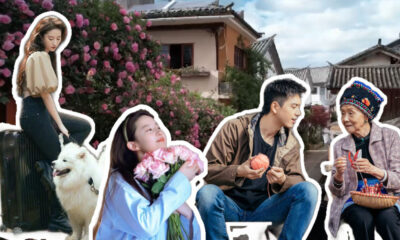






André Schappo
January 28, 2017 at 1:18 am
Actually, 难忘今宵 is growing on me and it is only the second year I have watched the CCTV New Year’s Gala????